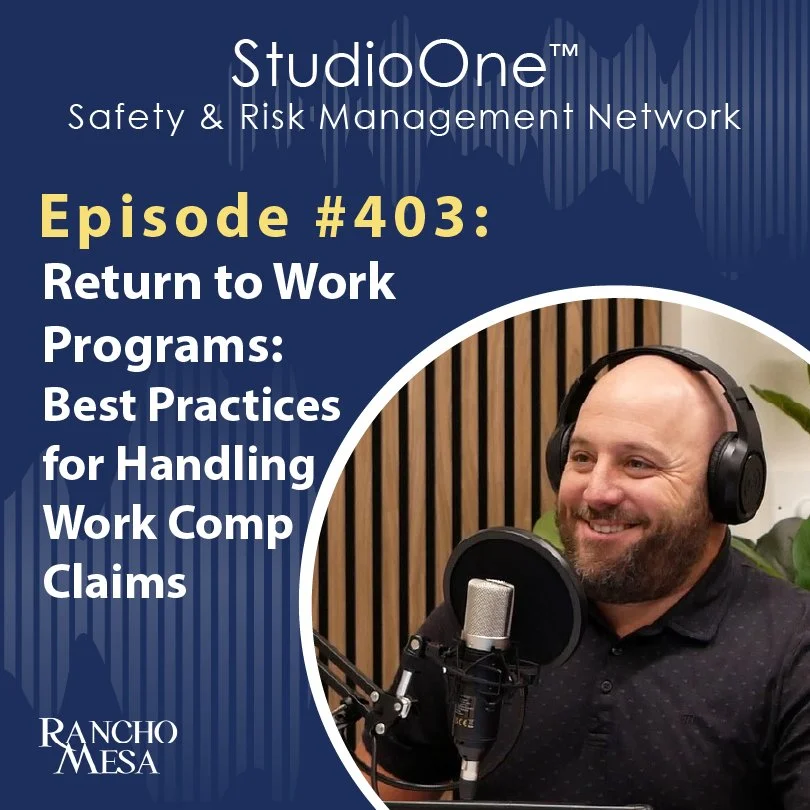Ep. 403 Return to Work Programs: Best Practices for Handling Workers' Comp Claims
Rancho Mesa's Media Communications & Client Services Manager Alyssa Burley and Account Executive Casey Craig discuss return to work programs as a best practice for handling workers’ compensation claims.
Show Notes: Subscribe to Rancho Mesa's Newsletter.
Director/Host: Alyssa Burley
Guest: Casey Craig
Producer/Editor: Megan Lockhart
Music: "Home" by JHS Pedals, “News Room News” by Spence
© Copyright 2024. Rancho Mesa Insurance Services, Inc. All rights reserved.
Transcript
Alyssa Burley: Hi, this is Alyssa Burley with Rancho Mesa's Media Communications and Client Services Department. Thank you for listening to today's top Rancho Mesa news brought to you by our Safety and Risk Management Network, StudioOne. Welcome back everyone. My guest is Casey Craig, Account Executive with Rancho Mesa. He specializes in providing commercial insurance for paint, plaster, and drywall contractors. Today we're going to talk about return to work programs as a best practice for handling workers' compensation claims. Casey, welcome to the show.
Casey Craig: Thanks for having me.
AB: Of course. So we're always promoting safe workplace practices but regardless of how many safety trainings an employer does or safety procedures that are in place, it's possible that a really great employee could get injured on the job. And there will be times that they can't quite come back to full duty for a period of time. So why is having a return to work program so important for controlling workers' compensation claims?
CC: It's a good question. I mean, it's really the only variable that we have control over in the claims process. There's the medical portion that the doctors are going to be taken care of and the carriers do the overview to make sure that all the billing is done properly. Permanent disability is a part of it as well. if they're going to be out for a long time, there's really not much we can do that's really set up by the state. Temporary disability is the only part of this that when we're looking at it, you can choose to have these employees return to work, which can cut down on the claims cost, which at the end is really going to help save on your mod. There's a benefit to that, I mean, if they're on temporary disability for two years, you know, we're getting towards where we've paid a lot more towards the claim, but when somebody gets injured those first couple weeks, how we're handling it is pretty important.
AB: All right. So how can a return to work program reduce the cost of a claim?
CC: So the work comp doctors, they provide the work restrictions, which are limiting. But if you can find any way to accommodate them, every dollar that you're able to save as an employer on the reemployability or return to work, doesn't go towards your mod and everybody's got a primary threshold. So every dollar that you can keep out of that below that primary threshold leads to savings on your mod over time.
AB: And I'm sure it keeps employees engaged and not feeling like they're on their own, right?
CC: Absolutely, yeah. Keeping morale up at the job site is really important too, so if you've got a lot of guys that are injured and out, all the other employees see that as well. So having them come back, make that employee feel valued, keeps the camaraderie with everybody up. And then the big part of it that a lot of employers don't like is when they're sitting at home, they're able to see all these commercial for all of the injured workers “We can save you a ton of money.” So it keeps fraudulent claims off your book as well.
AB: Yeah. We know people are sitting at home and there are a lot of commercials about, “Hey, have you been injured at work? I can get you a bunch of money,” and that's not necessarily the case. But, you know, we want to try to prevent those potential fraud claims.
CC: It tends to not be the case. I mean, I think most of the time when you're going through that, the lawyer over promises and they're trying to get as many cases as they can, drag them out as long as they can. So it really hurts the employer.
AB: Right, and the employee.
CC: Yeah, so I mean, at the end of it, there's really not a win, but it's that whole thing of they're dangling a carrot out in front of you. You get a little excited.
AB: Yeah, so Casey, if listeners have questions about their return to work program options, what's the best way to get in touch with you?
CC: Yeah, I can be reached at ccraig@RanchoMesa.com or you can call me at 619-438-6900.
AB: Alright, well Casey, thank you for joining me in StudioOne.
CC: Thanks for having me.
AB: This is Alyssa Burley with Rancho Mesa. Thanks for tuning in to our latest episode produced by StudioOne. For more information, visit us at RanchoMesa.com and subscribe to our weekly newsletter.

